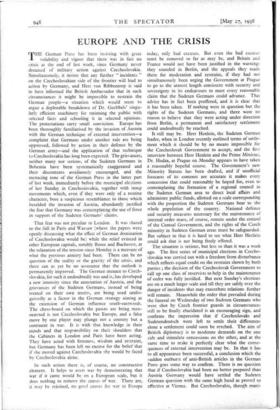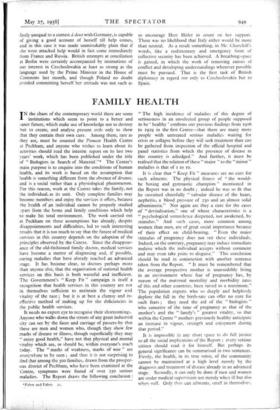EUROPE AND THE CRISIS
THE German Press has been insisting with great volubility and vigour that there was in fact no crisis at the end of last week, since Germany never dreamed of military action against Czechoslovakia. Simultaneously, it insists that any further " incidents " on the Czechoslovakian side of the frontier will lead to action by Germany, and Herr von Ribbentrop is said to have informed the British Ambassador that in such circumstances it might be impossible to restrain the German people—a situation which would seem to argue a deplorable breakdown of Dr. Goebbels' singu- larly efficient machinery for rationing the public with selected facts and schooling it in selected opinions. The protestations carry small conviction. Europe has been thoroughly familiarised by the invasion of Austria with the German technique of external intervention—a complaint that Germans under another rule are being oppressed, followed by action in their defence by the German army—and the application of that technique to Czechoslovakia has long been expected. The grievances, neither many nor serious, of the Sudeten Germans in Bohemia have been systematically exaggerated and their discontents assiduously encouraged, and the menacing tone of the German Press in the latter part of last week, immediately before the municipal elections of last Sunday in Czechoslovakia, together with troop movements which, even if they were only of a routine character, bore a suspicious resemblance to those which heralded the invasion of Austria, abundantly justified the fear that Germany was contemplating the use of force in support of the Sudeten Germans' claims.
That fear was not peculiar to London. It was shared to the full in Paris and Warsaw (where the papers were openly discussing what the effect of German domination of Czechoslovakia would be) while the relief evinced in other European capitals, notably Rome and Bucharest, at the relaxation of the tension since Monday is a measure of what the previous anxiety had been. There can be no question of the reality or the gravity of the crisis, and there can as yet be no assurance that the outlook is permanently improved. The German menace to Czech- slovakia, for such it undoubtedly was and is, has developed a new intensity since the annexation of Austria, and the grievances of the Sudeten Germans, instead of being treated on their own merits, are being used undis- guisedly as a factor in the German strategy aiming at the extension of German influence south-eastwards. The chess-board on which the pawns are being man- oeuvred is not Czechoslovakia but Europe, and a false move by one player may plunge not a country but a continent in war. It is with that knowledge in their minds and that responsibility on their shoulders that the Cabinets in London and Paris have been acting. They have acted with firmness, wisdom and restraint, but Germany has been left no excuse for the belief that if she moved against Czechoslovakia she would be faced by Czechoslovakia alone.
In such action there is, of course, no constructive element. It helps to avert war by demohstrating that war if it came would be on a European scale, but it does nothing to remove the causes of war. There are, it may be rejoined, no good causes for war in Europe today, only bad excuses. But even the bad excuses must be removed so far as may be, and Britain and France would not have been justified in the warnings they sounded in Berlin, and the appeals they made there for moderation and restraint, if they had not simultaneously been urging the Government at Prague to go to the utmost length consistent with security and sovereignty in its endeavours to meet every reasonable claim that the Sudeten Germans could advance. That advice has in fact been proffered, and it is clear that it has been taken. If nothing were in question but the rights of the Sudeten Germans, and there were no reason to believe that they were acting under direction from Berlin, a permanent and satisfactory settlement could undoubtedly be reached.
It still may be. Herr Henlein, the Sudeten German leader, when in London recently outlined terms of settle- ment which it should be by no means impossible for the Czechoslovak Government to accept, and the first interview between Herr Henlein and the Prime Minister, Dr. Hodza, at Prague on Monday appears to have taken a reasonably hopeful course. The Government's new Minority Statute has been drafted, and if unofficial forecasts of its contents are accurate it makes every concession that could reasonably be hoped for, even to contemplating the formation of a regional council in the Sudeten German area to direct local affairs and administer public funds, allotted on a scale corresponding with the proportion the Sudeten Germans bear to the whole population of the country. National defence and security measures necessary for the maintenance of internal order must, of course, remain under the control of the Central Government, and the rights of the Czech minority in Sudeten German areas must be safeguarded. But subject to that it is hard to see what Herr Henlein could ask that is not being freely offered.
The situation is serious, but less so than it was a week ago. The first series of municipal elections in Czecho- slovakia was carried out with a freedom from disturbance which reflects equal credit on the restraint shown by both parties ; the decision of the Czechoslovak Government to call up one class of reservists to help in the maintenance of order was fully justified. But next Sunday's elections are on a much larger scale and till they are safely over the danger of incidents that may exacerbate relations further will remain. Meanwhile the order that prevailed during the funeral on Wednesday of two Sudeten Germans who were shot by Czech frontier guards in circumstances still to be finally elucidated is an encouraging sign, and confirms the impression that if Czechoslovaks and Sudetendeutsch were left to settle their differences alone a settlement could soon be reached. The aim of British diplomacy is to moderate demands on the one side and stimulate concessions on the other, and at the same time to make it perfectly clear what the conse- quences of external intervention may be. In that it has to all appearance been successful, a conclusion which the sudden outburst of anti-British articles in the German Press goes some way to confirm. There is no question that if Czechoslovakia had been no better prepared than Austria Germany would have settled the Sudeten German question with the same high hand as proved so effective at Vienna. But Czechoslovakia, though maw:- festly unequal to a contest a deux with Germany, is capable of giving a good account of herself till help comes, and in this case it was made unmistakably plain that if he were attacked help would in fact come immediately from France and Russia. British attempts at conciliation at Berlin were certainly accompanied by intimations of our interest in Czechoslovakia at least as strong as the language used by the Prime Minister in the House of Commons last month, and though Poland no doubt avoided committing herself her attitude was not such as to encourage Herr Hitler to count on her support. There was no likelihood that Italy either would be more than neutral. As a result something, in Mr. Churchill's words, like a rudimentary and emergency form of collective security has been achieved. A breathing-space is gained, in which the work of removing causes of conflict and developing understandings wherever possible must be pursued. That is the first task of British diplomacy in regard not only to Czechoslovakia but to Spain.



















































 Previous page
Previous page